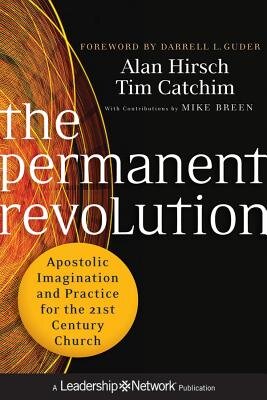Alan Hirsch and Tim Catchim, The Permanent Revolution: Apostolic Imagination and Practice for the 21st Century Church (Jossey-Bass Leadership Network Series). Jossey-Bass, 2012.
Referenced in: Missional Leadership Strategies
LifeandLeadership.com Summary
Alan Hirsch is very instrumental in renewing the 21st century church’s grasp of the five-fold ministry of Ephesians 4, using the currencies of apostle, prophet, evangelist, shepherd, and teacher (APEST). He introduces the model as a whole in his book, The Forgotten Ways. In The Permanent Revolution, he and co-author Tim Catchim expand on the APEST model as a whole, but then focuses on the first of these functions, apostleship, or missional entreprenership. He gives what is perhaps the most extensive theological and practical integration on the subject to date.
As one would expect, their theological base is Ephesians 4:1-16. Their theoretical base is “The Life Cycles of Movements,” which describes the first stage of the path of decline as “organizational doubt,”
the situation where prevailing organizational systems and designs originally used to host and transmit the founding ideals no longer get the job done. It goes like this: “We very much believe our message, but we can’t seem to deliver it as effectively as we used to, and we feel bad about it.” Operational doubt will become caustic and destructive unless the church’s organizational expressions are appropriately realigned to move adequately suit its purposes and mission. Unless it is properly resolved, this doubt will become entrenched and gnaw away at the soul of the ecclesia. (xxxi)
From this stage, religious organizations increasingly degenerate into a kind of
ideological doubt, where we no longer believe the message itself, and from there the organization devolves into ethical doubt, where we begin to behave badly because there is not good reason not to. This life cycle eventually ends with absolute doubt, which precipitates closure: the death of the original movement. (xxxi)
The authors offer very substantive support from both organizational and leadership theory that the situation will not improve without very serious reinventive efforts. At the heart of these efforts much be a revisioning of both the church and its leadership, with the link between these that they become apostolic, a theme that is developed richly through the rest of the book.
From the Publisher
The Permanent Revolution
The Permanent Revolution is an original work of theological re-imagination and re-construction that draws from biblical studies, theology, organizational theory, leadership studies, and key social sciences. The book elaborates on the apostolic role rooted in the five-fold ministry from Ephesians 4 (apostles, prophets, evangelists, shepherds, and teachers), and its significance for the missional movement.
Throughout the book, the authors propose a revolutionary missional ecclesiology that is shaped by the New Testament account of apostolic imagination, ministry, and strategy. The aim is to reclaim the ministry by which the church is to remain centered on its calling to be the instrument of God’s mission, and that everything it is and does ought to relate to and demonstrate that calling. To (re)capture the practice of apostolicity, the authors explore how the apostolic ministry facilitates ongoing renewal in the life of the church and focus on leadership in relation to missional innovation and entrepreneurship. They examine the nature of organization as reframed through the lens of apostolic ministry and explore how apostolic leadership provides new and missionally creative ways forward.
The Permanent Revolution is filled with challenging concepts and is replete with innovative ideas. Rather than providing a prescriptive model for leadership, it offers spiritual prods and suggestive thought experiments that are designed to stimulate imagination as well as action. If faithful leaders are to take up the work of ministry as laid out in the New Testament, this book offers a significant pathway to help equip them to better fulfill their mission.
About the Authors
Alan Hirsch is the founding director of Forge Mission Training Network. Currently he co-leads Future Travelers, an innovative learning program helping megachurches become missional movements. Known for his innovative approach to mission, Alan is considered to be a thought-leader and key mission strategist for churches across the Western world. Hirsch is the author of The Forgotten Ways; co-author of The Shaping of Things to Come, ReJesus, and The Faith of Leap (with Michael Frost); Untamed (with Debra Hirsch); Right Here, Right Now (with Lance Ford), and On the Verge (with Dave Ferguson). Alan is co-founder and professor for the M.A in Missional Church Movements at Wheaton College (Illinois), as well as adjunct professor at Fuller Seminary, and George Fox Seminary. He is series editor for Baker Books’ Shapevine series, IVP’s Forge series, and an associate editor of Leadership Journal.
Tim Catchim is a grassroots church planter experimenting with innovative forms of mission. While working as a church planting assistant and evangelist with the Montgomery (Alabama) Inner City Ministry, he started a mentor program for at-risk youth that gained state recognition. He also started an intensive summer internship that trained students to do missional-incarnational forms of ministry among the urban poor. He is currently planting a network of missional communities in Clarksville, Tennessee. He also serves as the founder and director of Generate, a coaching and consultancy agency for apostolic ventures.
***For additional information on this resource, including reviews, click the bookstore links. Check the reference at page top or the links below for resource guides on related topics.***
See Resources on Over 100 Areas of Ministry Leadership:


